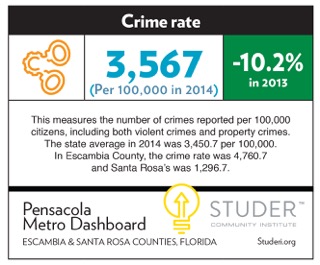FDLE looking into Florida's rape kit backlog
- September 24, 2015
- / Shannon Nickinson
- / community-dashboard

Rape victims often wait a long time for justice.
With an eye toward reducing that wait, state and federal officials are looking to boost funding to help speed up the processing of evidence collected from sexual assault victims — commonly called rape kits. Florida Attorney General Pam Bondi has said the backlog in Florida numbers in the thousands.
Officials at the Florida Department of Law Enforcement say they are in the process of surveying about 400 law enforcement agencies in the state to try to determine the extent of the backlog. Their report is due to the legislature in January 2016, says Steve Arthur, communications director for FDLE.
“We sent the assessment out three weeks ago and we’ve received about 100 responses so far,” Arthur says by email.
That assessment could be important for Escambia County, which is seeing an uptick in the crime rate — and in sexual assaults — at the six-month mark in data collection. Data from the Sheriff’s Office shows a 36 percent increase in reported forcible rapes for the first six months of 2015, compared to the first six months of 2014. Seventy-nine rapes were reported as of June 30; 58 were reported in 2014.
Pensacola Police Department data shows a 40 percent increase in reported forcible rapes for the first six months of 2015, compared to the first six months of 2014. Fourteen rapes were reported in the city limits in the first six months of 2015; 10 were reported in the same time frame in 2014.
The crime rate is one of 16 quality of life measurements that the Studer Community Institute’s Pensacola Metro Dashboard tracks. Created in consultation with the University of West Florida’s Office of Economic Development and Engagement, the dashboard is an at-a-glance look at the social, economic and educational well-being of our community.
Both the Sheriff’s Office and PPD said they do not have a backlog of rape kits in need of processing.
Capt. Paul Kelly, who supervises the police department’s Criminal Investigations Division, said PPD sends all kits immediately to FDLE unless there are extenuating circumstances that would require some follow-up prior to sending the kit.
“An example of extenuating circumstances that would cause us to hold the kit at least temporarily before sending it to FDLE would be where collected evidence clearly shows the victim’s story to be suspect,” Kelly says.
For example, Kelly said, the victim claims she was sexually battered in a vehicle and pushed out of the car by a named perpetrator, but video evidence shows the two people together hours after the alleged criminal act in a store buying refreshments. Additional interviews and explanation would be warranted before the kit was sent to FDLE, he says.
Otherwise, Kelly says the kit is picked up from the hospital after the exam of the victim is completed and sent to FDLE. Once FDLE returns it, PPD keeps custody of the kit until it is no longer of evidentiary value.
“This means that if a person is arrested and convicted, the kit is destroyed after the time for the person to file an appeal has elapsed, and if no arrest was ever made, we keep the kit at least until the statute of limitations has run out,” Kelly says. “Normally, however, the kit is not destroyed. It is kept for many additional years out of the abundance of caution.”
Escambia's Chief Deputy Eric Haines said in an interview earlier this year that he hoped the increase in reported cases reflects that more women are willing to come forward and report what is traditionally "a very under-reported crime.
"Most of them are people they knew or a casual acquaintance so I don't know if it's a trend, hopefully not, or just more people comfortable in reporting that. If it were linked to a trend, like if women were getting raped in parking lots, then we’d be concerned about that, but these are people that they knew or a casual acquaintance. I hope it’s not a trend, but it’s hard to say."
A national and statewide problem
The evidence from these kits, once entered into a federal database, can yield connections in unsolved cases that are already in the system. But the delay in processing this evidence is not limited to Florida.
Nationwide, news outlets have been reporting on backlogs in testing evidence from rape kits.
The Louisville Courier-Journal has reported that the state of Kentucky now knows it has a backlog of more than 3,000 such cases. Reno public radio station KNUR reports that the backlog in Nevada is some 7,500 kits. Perhaps the highest profile instance of a backlog is from Ohio, where evidence from cases dating back 20 years remain untested, denying victims a chance at justice and potentially leaving suspects at large.
Earlier this month, it was announced that FDLE will receive $1,268,540 to process some 2,076 rape kits, part of $37.8 million in funding given out nationwide to help clear the national backlog of unprocessed kits, which contain evidence from sexual assault victims.
Manhattan District Attorney Cyrus R. Vance Jr., on Sept. 10, announced the grant awards to 32 jurisdictions in 20 states. The two-year awards, ranging in amount from about $97,000 to $2 million, will help test an estimated 56,475 rape kits, generating DNA evidence to, hopefully, help solve cases across the country.
FDLE’s Arthur says that grant is likely to go toward clearing a backlog of kits to be tested and reviewed in Florida’s Fourth Judicial Circuit and will include kits from Duval, Nassau and Clay counties.
Vice President Joe Biden and Attorney General Loretta E. Lynch joined Vance to announce the recipients of the U.S. Department of Justice’s Bureau of Justice Assistance’s separate, but complementary, $41 million Sexual Assault Kit Initiative (“SAKI”) Grant Program, which is expected to test about 13,500 kits in 20 jurisdictions.
In Florida, staffing, turnaround time are issues
Attorney General Bondi has put the issue in the spotlight, saying thousands of rape kits in the state have gone untested.
State Rep. Janet Cruz, D-Tampa, filed a bill for the 2016 legislative session that would require law enforcement agencies to adopt policies that include trying to ensure that evidence gets processed and returned to agencies within 12 months of alleged sexual assaults.
According to the News Service of Florida, the bill calls for an additional $1,000 in court costs for people convicted of certain sexual offenses, money that would go toward processing and analyzing medical evidence in investigations of alleged sexual assaults.
FDLE’s six labs statewide accept sexual assault kits from across the state. Those kits are processed and returned to the appropriate jurisdiction at no cost.
The issue is turnaround time.
Arthur says, in August 2015, the DNA/Biology units completed requests in an average of 107 days. The increased attention on untested sexual assault kits, while unquestionably a good thing, is increasing the turnaround time to process those kits, Arthur says.
“We expect the turnaround time in DNA/Biology to continue to increase,” Arthur said.
Another challenge is staff turnover.
Arthur says the FDLE labs “are never fully staffed.”
Starting salaries for forensic members are not competitive with many of our local and state counterparts, he said. A recent survey by the Florida State Fire Marshal shows the average salaries of FDLE analysts are about $24,000 less than the salary survey mean, he said.
In the past six years, FDLE has lost 127 crime laboratory analysts and crime laboratory analyst supervisors, representing a turnover of 44 percent of the workforce, Arthur noted.
According to the News Service of Florida, FDLE is expected to request an additional $35 million in funding during the 2016 legislative session, including $7.76 million to raise the base salaries of people working in crime labs.
The proposed pay increases — a $10,000 increase to the annual starting pay of crime-lab analysts and a $12,000 boost to the base pay for senior crime-lab analysts -— are intended to make the agency more competitive. The base pay for an analyst is $40,948 a year. A senior analyst starts at $43,507.

 CivicCon launches with a look at good growth in cities
CivicCon launches with a look at good growth in cities
 Building stronger brains one baby, one parent at a time
Building stronger brains one baby, one parent at a time
 SCI debuts commercial on Early Learning City
SCI debuts commercial on Early Learning City
 Entrecon: World class speakers and an opportunity to sharpen skills
Entrecon: World class speakers and an opportunity to sharpen skills
 PYP Quality of Life survey 2017
PYP Quality of Life survey 2017
 EntreCon Pensacola 2016: A look back
EntreCon Pensacola 2016: A look back
 Leadership tip: getting better employee takeaways
Leadership tip: getting better employee takeaways
 Leadership tip: be interested instead of interesting
Leadership tip: be interested instead of interesting
 Leadership tip: delivering difficult messages
Leadership tip: delivering difficult messages
 Brain Bags boost Arc, Early Childhood Court programs
Brain Bags boost Arc, Early Childhood Court programs